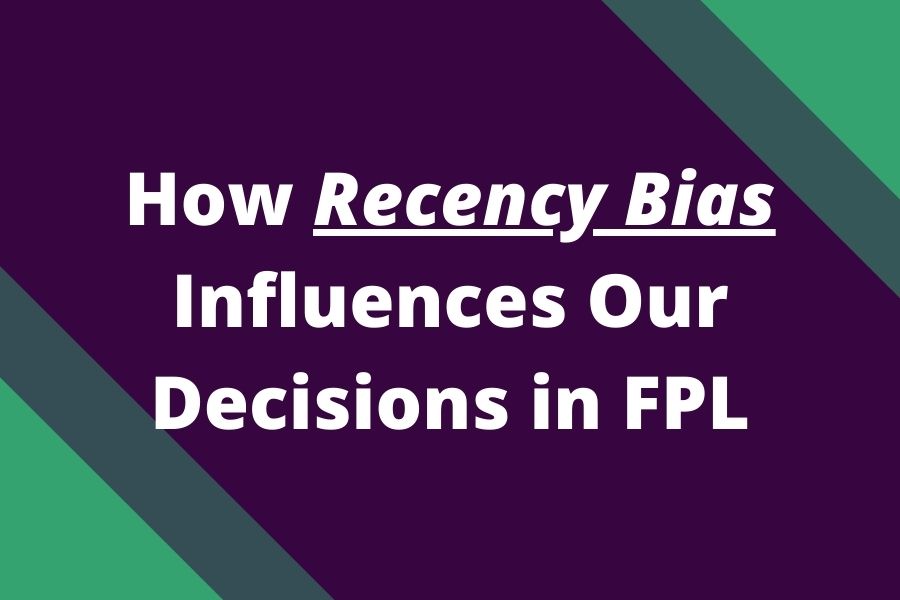With millions of players worldwide, FPL has evolved into a complex strategic game that demands insight, foresight, and sometimes a pinch of luck.
In the world of decision-making, cognitive biases are systematic patterns of deviation from norm or rationality, often leading us astray from optimal choices.
One such cognitive bias, and the centerpiece of our discussion, is the recency bias.
Understanding Recency Bias
At its core, recency bias refers to the tendency of individuals to weigh recent events or experiences more heavily than those that occurred in the distant past.
For example, if someone asks you about your favorite films and you’ve just seen a fantastic movie last week, you’re more likely to include that in your list, even if there are other classics you’ve loved for years.
So, why do we lean towards the recent past when making decisions?
This inclination can be traced back to our evolutionary past.
Our ancestors had to react quickly to immediate threats and opportunities in their environment. Thus, giving priority to recent events was advantageous for survival.
While the threats and rewards have changed dramatically in the modern world, this cognitive shortcut remains embedded in our psyche.
Recency Bias in Sports and Fantasy Games
Sports, with their weekly dramas and fluctuating fortunes, provide fertile ground for recency bias to thrive.
For an FPL manager, the decisions are continuous:
Whom to transfer in? Whom to captain? Should a player be benched?
When faced with such choices, the previous game week’s performances often scream the loudest. A midfielder who scored a brace or a defender who registered two assists and a clean sheet can suddenly seem indispensable.
On the contrary, consistent performers might be overlooked due to a single bad gameweek (or one bad season).
FPL Decisions Impacted by Recency Bias
- The Unexpected Hero: Let’s take the case of a hypothetical player. Historically, he averages a goal every five matches. However, in one particular game week, he nets twice and provides an assist. FPL forums explode with discussions, and thousands transfer him in, hoping for a repeat performance. The subsequent three game weeks see him return to his average, and those who brought him in based on one game week’s heroics are left ruing their decision.
- The Short-Lived Drop in Form: Consider a premium forward, a proven FPL asset over multiple seasons. He goes three game weeks without a goal, leading to a massive exodus of managers transferring him out. The fourth week, he bags a hat-trick. Those swayed by the recent drought miss out on a massive haul.
- The Bandwagon Effect: One standout player performance can lead to a domino effect. As more and more FPL managers transfer in this player, others follow suit out of fear of missing out. Often, this results in inflated expectations and potential disappointment when that player reverts to the mean.
By dissecting these scenarios, it’s evident how easily managers can be swayed by the immediate past, sidelining the larger picture or the broader dataset.
The Ripple Effect of Recency Bias in FPL
Allowing recency bias to drive our FPL decisions can lead to a cascade of repercussions:
Disruption of Long-term Strategies
Effective FPL management often requires planning several gameweeks in advance, accounting for upcoming fixtures, potential rotations, and other variables. By making reactionary transfers based on a single gameweek, one can derail well-laid plans, resulting in suboptimal team setups in subsequent weeks.
Misguided Captaincy Choices
The captain’s armband, offering double points for one player, is a crucial decision each gameweek. Recency bias might tempt managers to captain a player who scored big the previous week, overlooking more consistent options or those with better fixtures.
Impact on Overall Rank
Knee-jerk decisions can lead to wasted transfer points or missed hauls, significantly affecting a manager’s overall rank. In the highly competitive world of FPL, every point counts, and the compounded effect of several recency-biased decisions can mean the difference between a top 10,000 finish and one outside the top 100,000.
This ripple effect underscores the importance of holistic decision-making in FPL, where each choice carries potential long-term implications.
Strategies to Counteract Recency Bias
To make well-informed decisions in FPL, recognizing and overcoming recency bias is crucial. Here are actionable strategies to maintain an edge:
- Holistic Player Analysis: Instead of focusing solely on the last few gameweeks, analyze a player’s performance over a larger sample size. Platforms like the official FPL website and Understat provide extensive data over multiple gameweeks or even seasons, offering a more complete picture.
- Patience is a Virtue: Often, the best transfer decision is to make no transfer at all. Give your assets the time and opportunity to deliver. While it’s tempting to react to one poor gameweek, remember that even the best players can have off days.
- Engage in Community Discussions: The FPL community is vast and diverse. Engaging in discussions on forums, Twitter, or podcasts can expose you to various viewpoints, helping you see beyond your own biases. However, be wary of following the herd; seek out contrarian opinions as well to challenge the consensus.
- Set Long-term Strategies: While it’s essential to be flexible, having a long-term strategy can act as a guiding light. For instance, planning your transfers around fixture swings or double gameweeks can keep you focused and less prone to making impulsive decisions.
- Use a Decision Journal: Document your thought process for each decision, noting why you’re considering certain transfers or captaincy choices. Reviewing this journal over time can highlight patterns in your decision-making, helping you recognize and rectify biases.
Conclusion
Fantasy Premier League, while rooted in football, is as much a game of strategy and decision-making as it is about the sport. In this environment, biases like the recency bias can be particularly potent, leading managers astray from their goals.
However, with awareness, reflection, and the application of the strategies mentioned above, one can navigate the FPL waters more adeptly, ensuring a rewarding experience both in terms of points and personal enjoyment.




